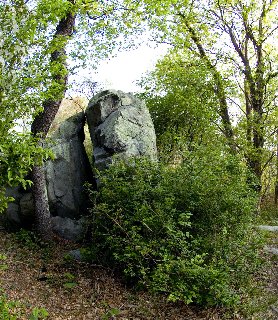On Protecting Canonchet #1
The Master Plan
On Protecting Canonchet #2
Appropriate Uses
On Protecting Canonchet #3
Management of the Park
On Protecting Canonchet #4
Finance Issues
Photos:
Cleanup at Lake Canonchet
September 10, 2011
Charlie Lee Remembrance
February 6, 2011
Canonchet History
Who was Canonchet?
by Richard Vangermeersch
Canonchet Farm Master Plan
Town Council Holds Workshop on Planning Board Report
Our Response
October 21, 2010
Our Vision and Recommendations for Canonchet Farm
April 2009
Pictures
Guided Walks Fall 2010
Beech Grove Cleanup Complete
Cleanup - Day 4
October 31, 2009
Beech Grove
Cleanup - Day 2
October 9, 2009
Tom Wessels
Guided Walk
October 10, 2009
Other Links
Narrow River Preservation Association
On Protecting Canonchet #3Management of the ParkRegardless of the makeup of the commission or committee to oversee the implementation of the master plan, the day-to-day management of the park cries out for professional attention. The Friends of Canonchet Farm has offered the town its services in this regard, including on-site management, development of educational programs and fund raising. Regardless of who undertakes this operation, certain basic skill sets and practices must be in place. The management of Canonchet Farm as a natural park should be dedicated to the enjoyment of the public and can be prioritized into several categories: Safety, Functionality, Upkeep and Presentation. Safety: It is the primary role of management to assure, to the best of its ability, that the public is safe within the park. As in any public facility, the greatest personal tragedy, financial liability and public image issues lie in the category of safety. Problems can only be prevented with responsible, thorough and experienced daily oversight. Functionality: For the public to fully enjoy the park, targeted forest management and added amenities have to be developed so as to access its existing natural and historical features. If management doesn’t attend to this work, public pressure for alternative uses will continually threaten to replace the intended purpose of the park. Upkeep: In a natural park, like Canonchet Farm, the environment is the enjoyed feature. Far from being self-sustaining, a natural environment near an urban center is in need of specialized management to keep it healthy. The goal of keeping a dynamic diversity of natural environments is only met when the management team is thoroughly professional and centrally directed. In our current economic times, this work is dependent upon coordinated volunteerism, grants and charitable funding. Presentation: Management includes developing public programs to expand the visibility and public use of the park. The success of developing a large volunteer base, getting project grants and raising funds outside the town budget will depend upon increasing the number of people using the park. This is absolutely vital. Incidental and casual use alone will not bring a large enough following to maintain the facilities or keep the natural features accessible. Guided tours, nature education programs, environmental management training workshops, educational literature and signage will be necessary to acquaint people with the features and needs of the park. These programs will draw users into a deeper commitment to the park and spread the word about Canonchet Farm. On the other hand, some uses that draw large numbers of people, such as festivals, will degrade the natural and historical features of the property without improving the participants’ rate of volunteerism or support. All proposed uses will have to demonstrate an ability to complement and enhance the overall park management. These management issues have to be addressed by the town before an effective, responsible and sustainable facility can emerge. Initially, the work in these four categories would involve at least part time work of one senior staff member and part-time seasonal work of one or more support staff. The skill set needed by the senior staff member is unique and diverse, including:
We cannot emphasize enough the critical need for professional management of Canonchet Farm if it is to become a major contributor to the town’s economic and cultural enhancement. We support a goal of increased use of the Canonchet Farm property by a greater number of our citizens and visitors enjoying its natural and cultural features. We cannot overemphasize the fact that without improvements leading to increased use, public pressure for alternative uses will continually threaten the Canonchet Farm property. On Protecting Canonchet #1 On Protecting Canonchet #2 On Protecting Canonchet #3 On Protecting Canonchet #4 |
|
|||


